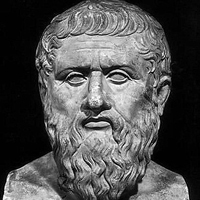Brief Summary on The Allegory of the Cave
Plato considers that the human life on this earth is like an ignorant and miserable life in a deep cave. People have their legs and necks chained so that they cannot move from their places or cannot see around them. There is fire above and behind them and they can see only the shadows falling over the walls, as in a puppet show.

Plato (427-347 BC)
Due to this limited condition, whatever they see on the wall is taken to be the truth. As they have been living with this condition for ages, they have no knowledge of the real world outside their cave. Thus, the images on the wall and the echo of various voices are the ultimate truth for them.
When any one of them is set free and dragged up to the mouth of the cave, he suffers sharp pains. First, his freed limbs give him pain, and then the toil of climbing upward gives him pain, and then the daylight of the outside real world dazzles his eyes. He has to habituate himself to the new surroundings and new objects. As his eyes get adjusted, he begins to see the real truth. Thus, he considers himself fortunate for having this opportunity to see the truth, and pities his fellow prisoners who are still living in that dark ignorant world.
Thus, according to Plato, the cave is the world of the senses, which prevents our upward journey to the world of reality. The upward journey is the rise of the soul into the intellectual world. In this world of knowledge, the idea of good comes at the end. Once this good is achieved, man gains all things beautiful and right ethically, and reason and truth intellectually.
Plato is of the opinion that it is the duty of the legislators to use such intellectuals in the management of the public affairs. At present, only the selfish and ambitious people are interested in administration. Such people are more interested in their self-gratification than in public service. That is why a state which is governed by many selfish people is always experiencing unrest. Those intellectuals, if pulled into public services, will govern the state jointly and therefore there will be peace, order and progress in such a state.
Browse by Question
The Allegory of the Cave
Critical Note on The Allegory of the Cave
The Allegory of the Cave: Meaning and Interpretation
 |
bachelorandmaster.com |